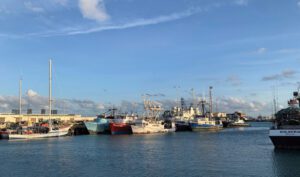
A Hawaii Supreme Court decision released Aug. 11 upholds the local longline fleet’s reliance on some foreign fishermen who can’t legally leave the dock when their boats arrive in Honolulu Harbor.
Specifically, the opinion gives the okay for state officials to grant commercial licenses to fishermen confined to the pier, although they have no legal status in the U.S. In its decision, the court said that it’s permissible because the state’s fleet of 140 or so longline vessels only fish in the deep ocean and not in state-designated waters closer to shore.
The ruling resolves the five-year-old case “Chun v. Board of Land & Natural Resources,” under which a Hawaiian man, Malama Chun, sued contending that the state’s Department of Land and Natural Resources could and should not issue commercial marine licenses (CMLs) to persons not lawfully admitted to the United States.
In its ruling, the state Supreme Court disagreed.
“The DLNR is not prohibited from issuing CMLs to foreign nonimmigrant crewmembers on longline fishing vessels who fish for highly migratory species outside of state waters,” the state Supreme Court wrote in its decision. “Because the longline fishing vessels at issue here do not fish within state waters, we affirm the circuit court’s order denying Chun’s petition.”
Hawaii’s longline fishing industry consists of about 140 boats that dock in Honolulu Harbor; they fish exclusively for “highly migratory species,” defined by the Magnuson-Stevens Conservation and Management Act as “tuna species, marlin, oceanic sharks, sailfishes and swordfish.
Federal regulations prohibit longline boats from fishing in specific areas around Hawaii. For example, longline boats can’t fish closer than about 50 miles to the north and east of the main Hawaiian Islands, and one hundred miles to the south and west of the main Hawaiian Islands. Longline fishing is also prohibited in the Exclusive Economic Zone (EEZ) around the Northwestern Hawaiian Islands, which extends 200 nautical miles seaward.
